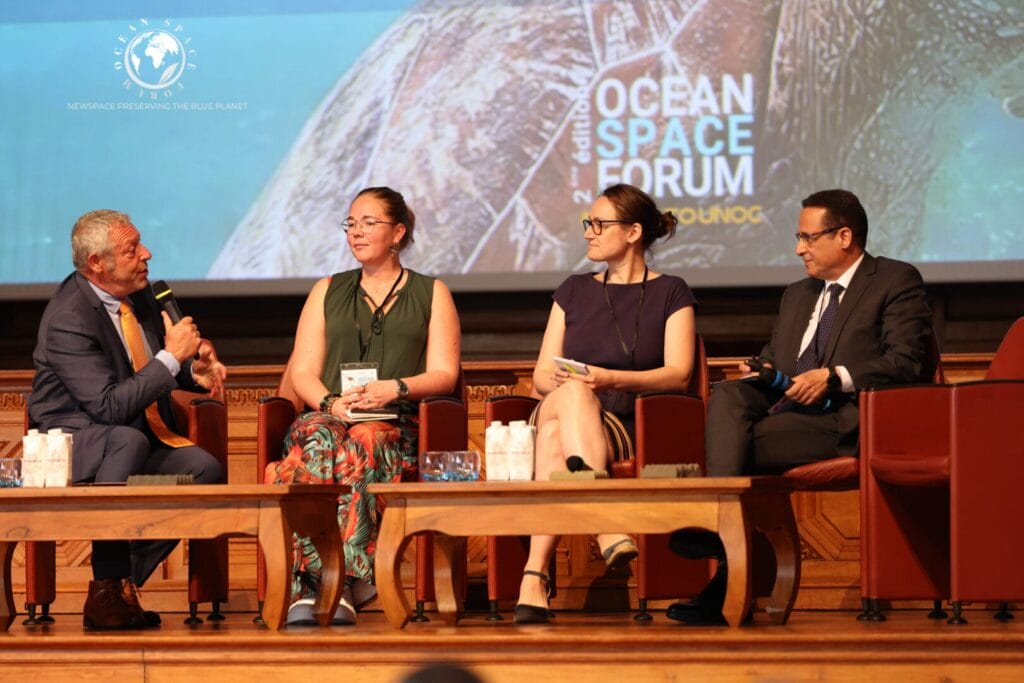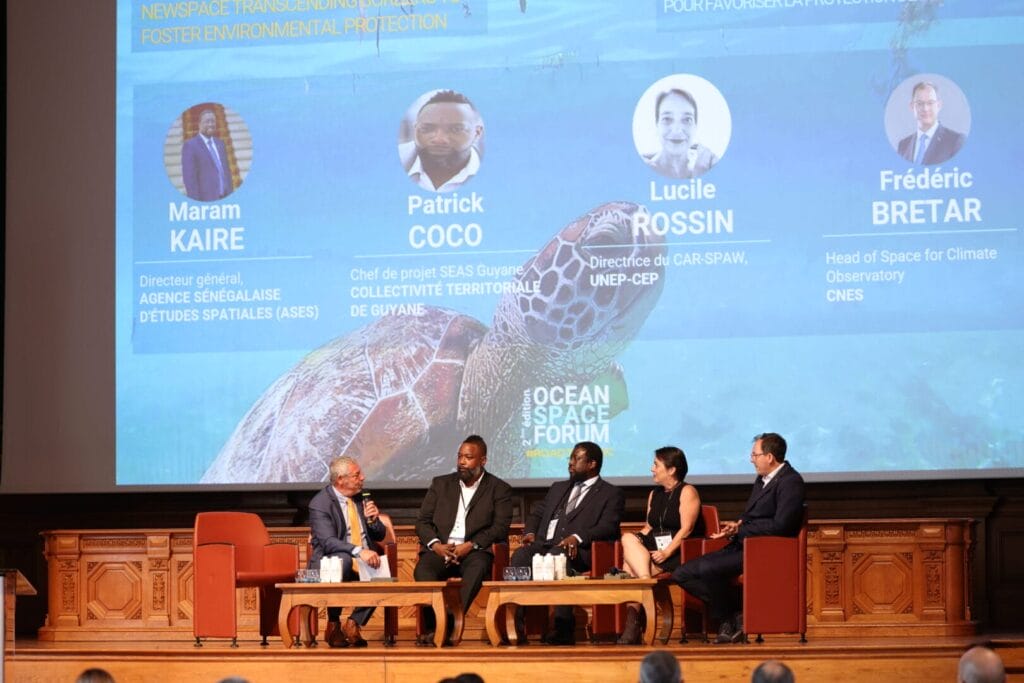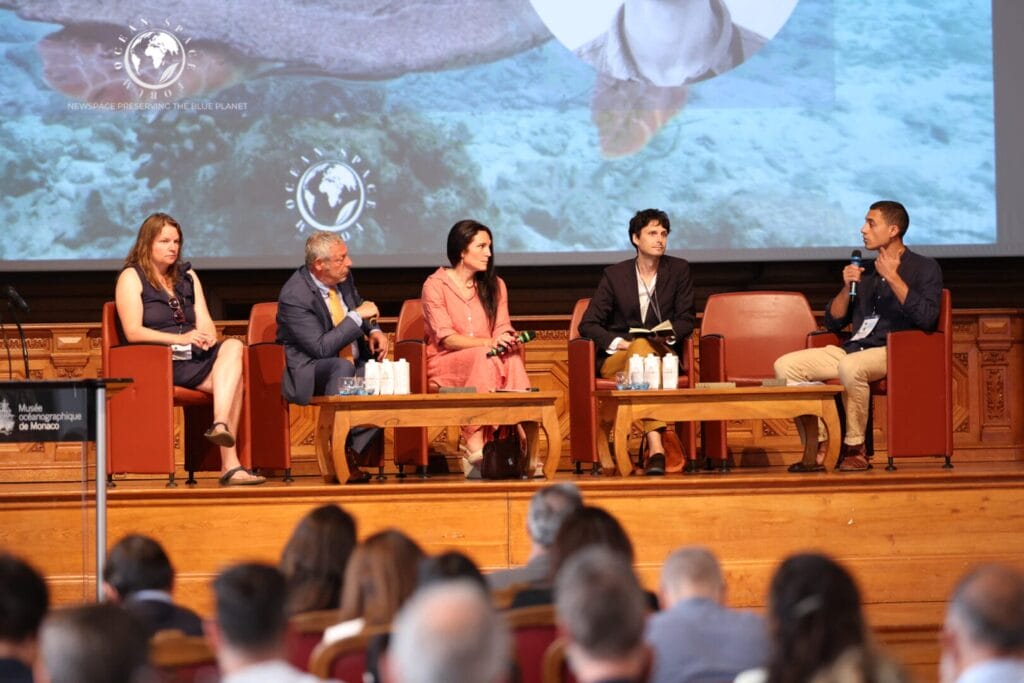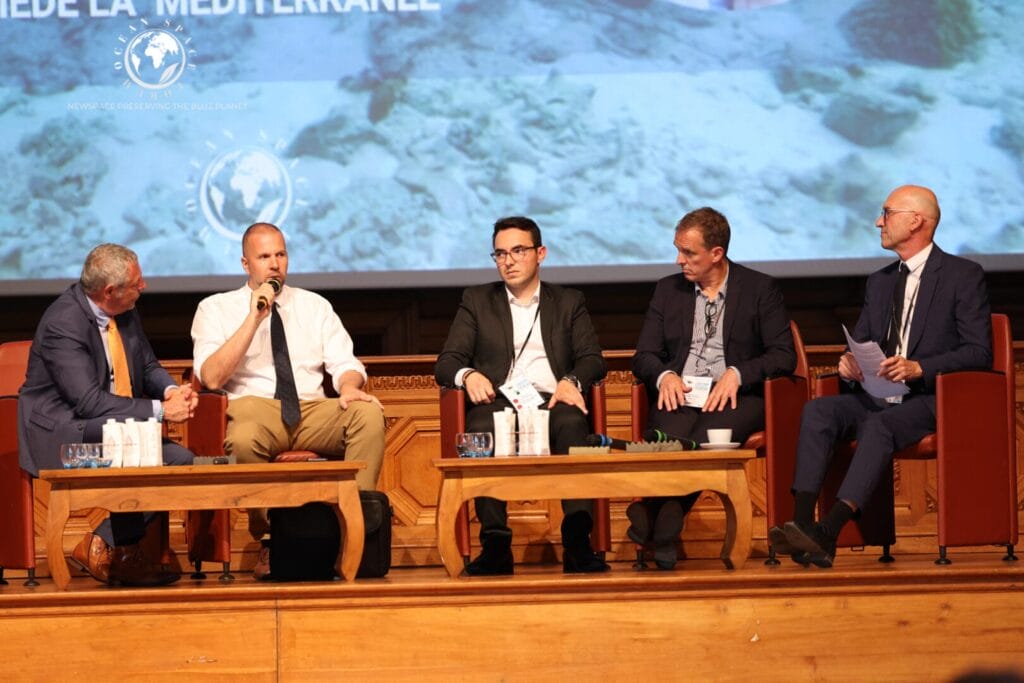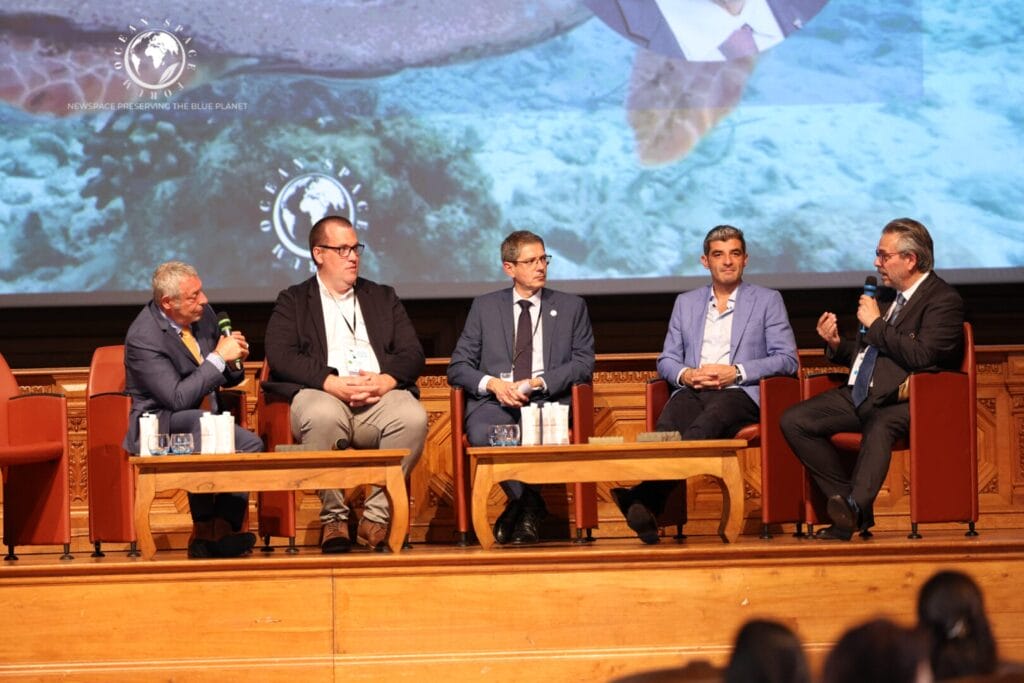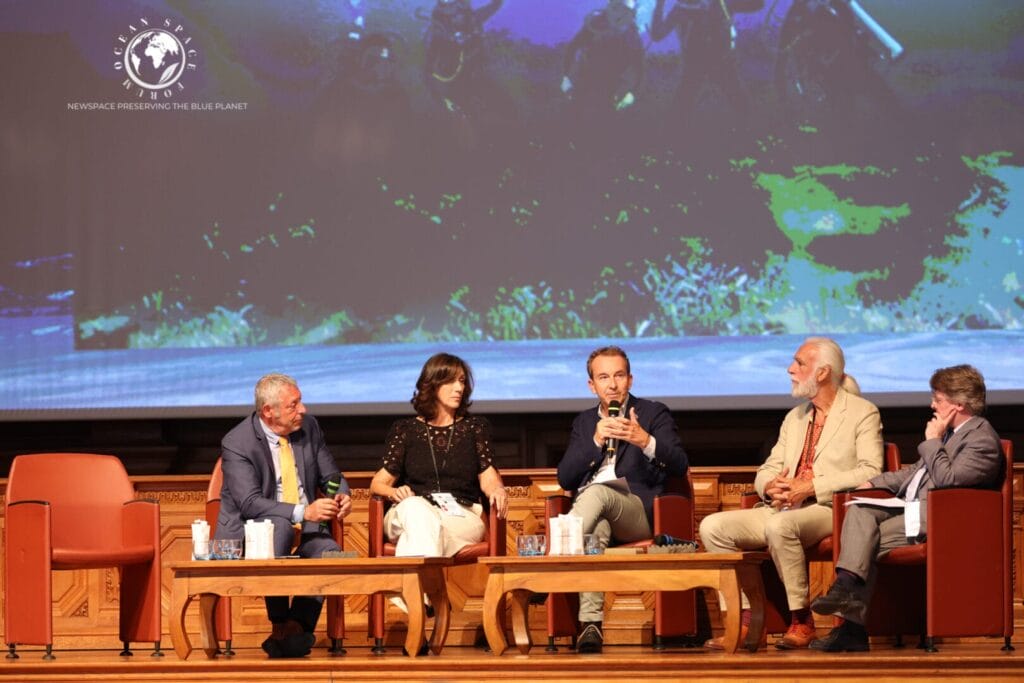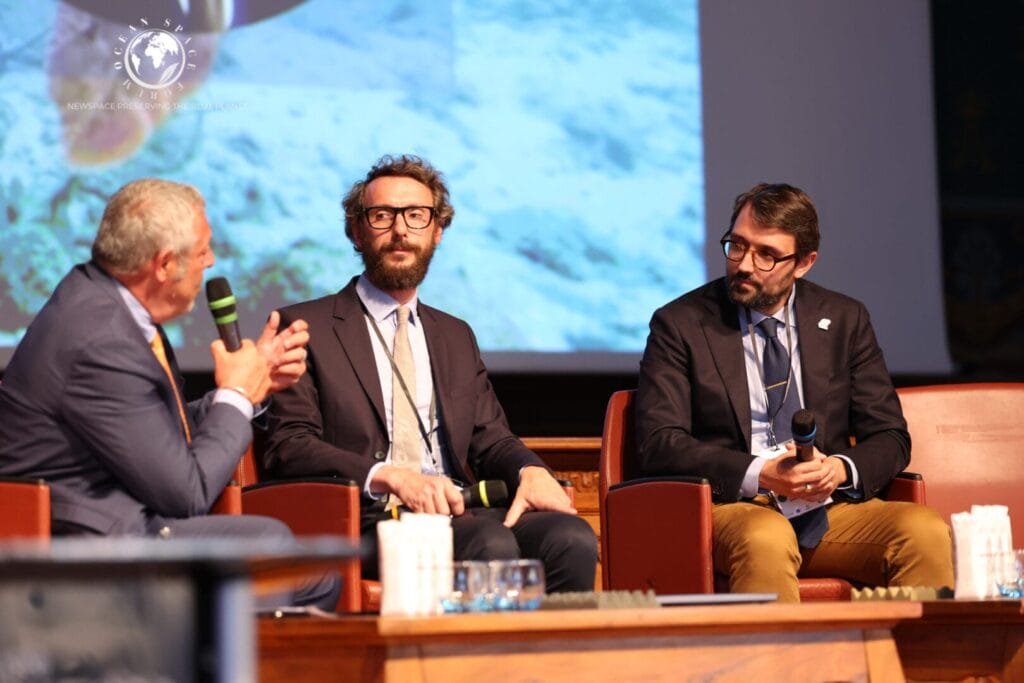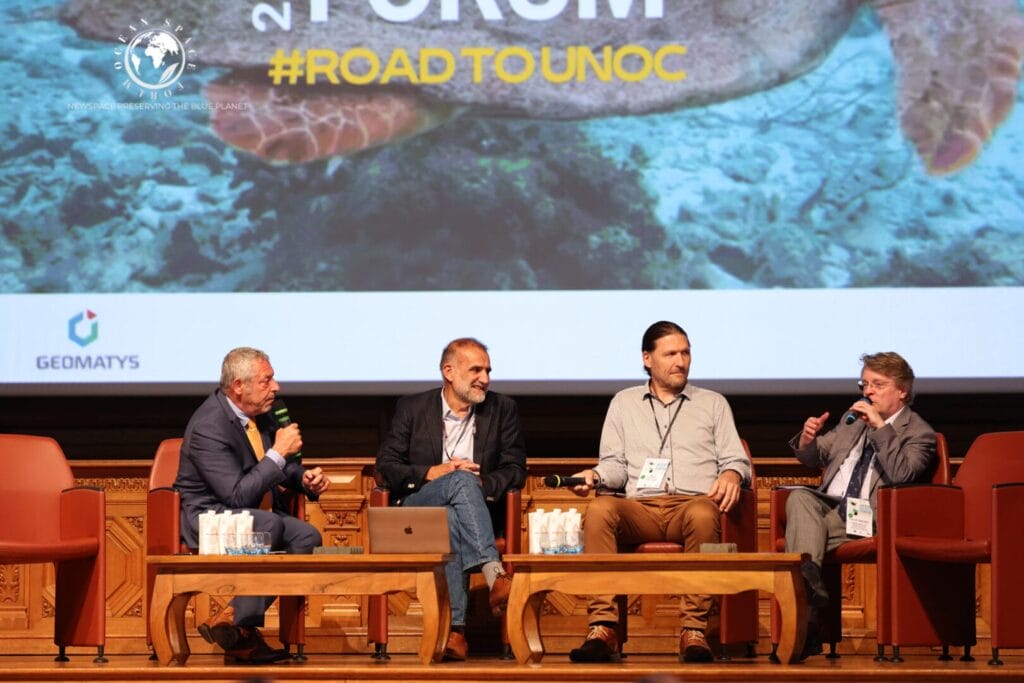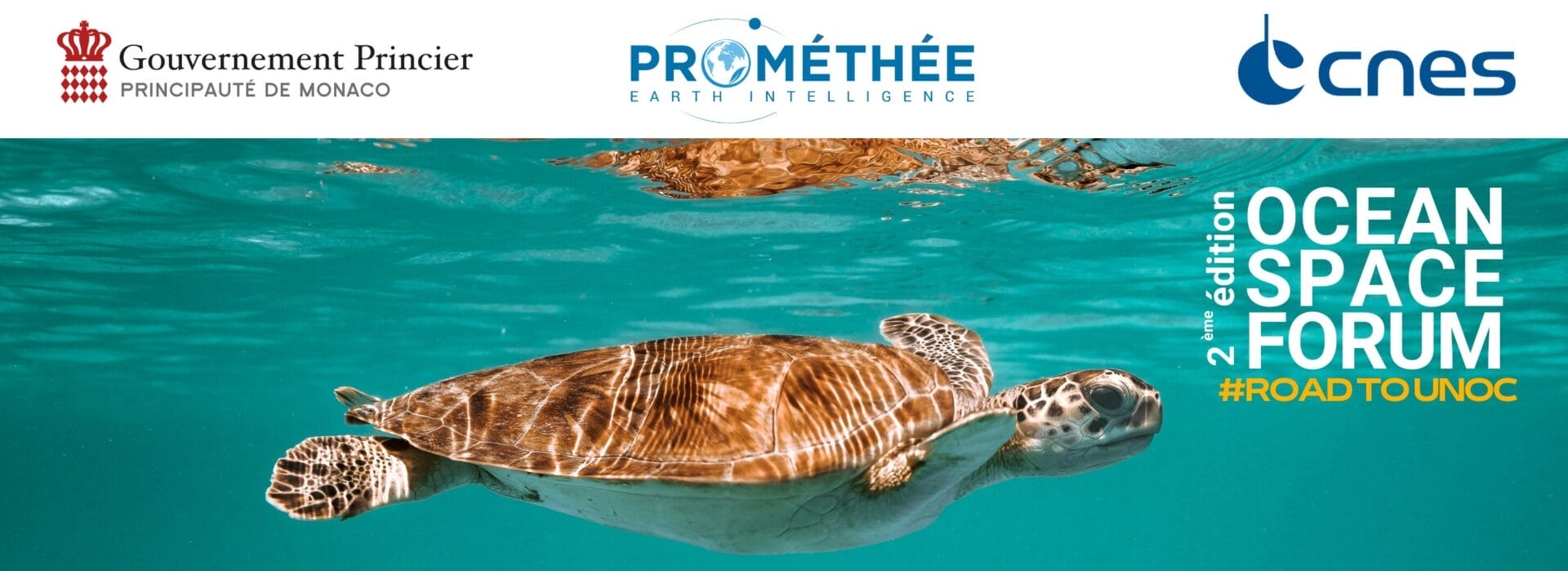
APPROVED BY*
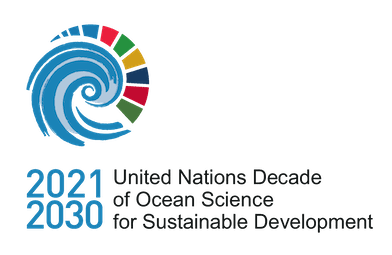
After the success of the first edition in 2023, Prométhée Earth Intelligence, CNES, and the Monaco Office of Space Affairs organized the second edition of the Ocean Space Forum on Tuesday, July 2, 2024, in the prestigious setting of the Oceanographic Museum of Monaco.
The program featured captivating panel discussions that explored, through the lens of space, essential topics such as the preservation of marine ecosystems, the development of the blue economy, the fight against climate change and its impacts on the oceans, and the conservation of marine resources.
Opening Session
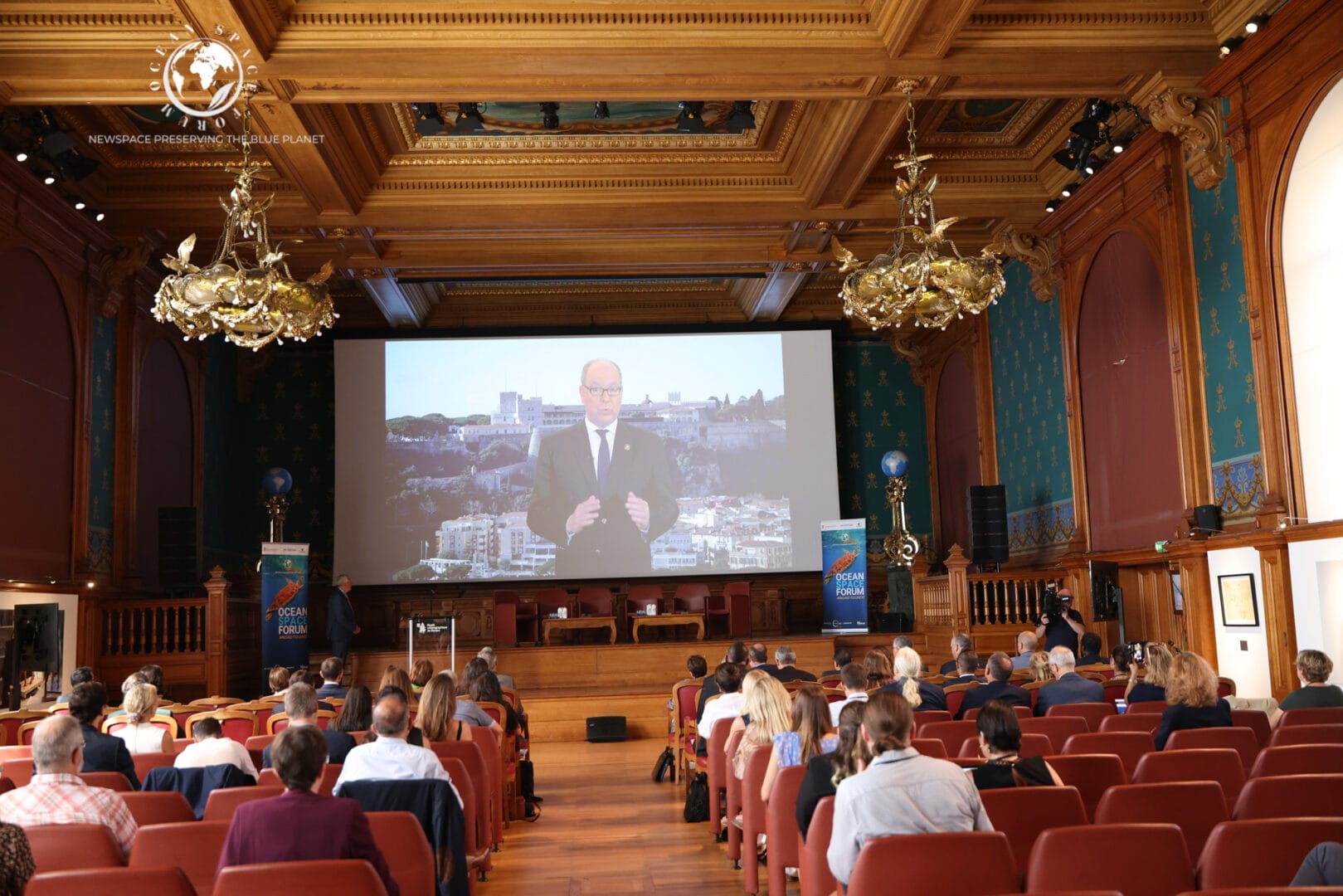
- In the opening, S.A.S. Prince Albert II of Monaco (video message)
« Je suis heureux de vous savoir réunis aujourd’hui dans cette enceinte emblématique qu’est le Musée océanographique (…). Le programme de la journée permettra d’illustrer – j’en suis persuadé – à quel point les données spatiales peuvent être un instrument précieux au service de la santé et de la durabilité de l’océan ». Le Souverain a souligné dans ce sens le « nouvel essor des technologies spatiales. Elles nous permettent de mieux connaître et comprendre notre océan à l’échelle mondiale, et ceci désormais en temps réel (…). Ces données n’ont jamais été aussi avancées, précises et disponibles, et méritent d’être pleinement utilisées pour atteindre nos ambitieux objectifs environnementaux » et de conclure « Cette deuxième édition de l’Ocean Space Forum se fonde sur le succès de sa première édition, en 2023, mais s’inscrit déjà dans la perspective de l’événement qui sera organisé l’année prochaine, à Nice, en marge de la troisième Conférence des Nations Unies sur l’Océan (…). Je suis convaincu que le spatial a beaucoup à offrir en réponse aux enjeux de cet événement multilatéral particulièrement important ».
- Frédéric GENTA, Délégué Interministériel à l’Attractivité et à la Transition Numérique, Gouvernement Princier
- Jean-Marc ASTORG, Directeur de la stratégie, CNES
- Olivier PIEPSZ, Président, Prométhée Earth Intelligence
Roundtable
Space shaping a new future for ocean sustainability
More than ever, the ocean needs space. Space technology is shaping our understanding and management of the ocean. The data collected enables scientists and policymakers to make informed decisions on the best ways to protect it. Sustainable management of seas and oceans requires concerted global efforts: the floor is now given to international organizations.
- Driss El HADANI, Deputy Director – Senior Adviser, United Nations Office for Outer Space Affairs (UNOOSA)
- Audrey HASSON, GEO Blue Planet European Coordinator, Mercator Ocean International
- Anne-Laure BECK, EO Engineer & Coastal Program Technical Manager, ACRI-ST
NewSpace transcending borders to foster environmental protection
Although all countries face climate change, some are more vulnerable than others. This panel discussion, featuring four countries from different continents, provided a perspective on various climate challenges and highlighted the key role of NewSpace.
- Maram KAIRE, Directeur général, Agence Sénégalaise d’Études Spatiales (ASES)
- Patrick COCO, Chef de projet SEAS Guyane, Collectivité Territoriale de Guyane
- Frédéric BRETAR, Responsable du Space for Climate Observatory, CNES.
- Lucile ROSSIN, Directrice du CAR-SPAW, UNEP-CEP
Cities and coasts adapting to rising sea level
Coastal cities are increasingly exposed to rising sea levels. In response to this phenomenon, space technologies provide a means to anticipate and implement protective measures for their populations.
- Aurore ASSO, Conseillère Municipale et Métropolitaine, Subdéléguée à l’Aire Marine Protégée, à la Mer et à l’Ecologie, Ingénieure Agronome ENSAT, Mairie de Nice
- Arnaud REAUX, Architecte et urbaniste, Nommos
- Théophile BONGARTS, Responsable du Pôle Adaptation Côtière – Plateforme Océan & Climat
- Aurélie DEHOUCK, Présidente, I-SEA
Protecting our waters : technology for sea safety
By offering the ability to monitor vast ocean areas in real time, space imaging allows for the surveillance of sensitive marine zones worldwide and the identification of potential illicit activities. Whether for the preservation of resources, territorial integrity, or aiding decision-making, space technology serves the security and sovereignty at sea.
- Pierre Luc LECOMPTE, Administrateur principal des affaires maritimes, Division « Action de l’Etat en Mer » Chef du Pôle Protection et Aménagement Durable de l’Espace Marin, Préfecture maritime de la méditerranée
- Patrick MUGNIER, Responsable lignes de produits “Sauvegarde Maritime” Direction technique, NAVAL Group
- Florent CHAMPION, Secrétaire exécutif, Secrétariat permanent de l’Accord RAMOGE
- Vincent HEURTEAUX, Président, Géomatys
NewSpace for the blue economy
Space technology contributes to the development of a blue economy. The sustainable use of ocean resources for economic growth and the management of livelihoods, while preserving the health of the ocean ecosystem, is becoming a reality.
- Olivier WENDEN, Vice-Président et Administrateur Délégué, Fondation Prince Albert II de Monaco
- Clément LAVIGNE, Directeur de la Politique de l’Océan, Institut océanographique, Fondation Albert Ier, Prince de Monaco
- Eric BREL, Expert Maritime et Outremers, CNES
- Samuel DUPONT, CEO, Bioceanor
Innovative technologies for biodiversity protection and blue carbon
This session was dedicated to the protection of biodiversity, actions in support of Marine Protected Areas, and the monitoring of blue carbon sequestration capacities. Space data provides essential information for the global and sustainable observation of coastal ecosystems that capture blue carbon, primarily through coral reefs, seagrass meadows, mangroves, and salt marshes.
- Susana SALVADOR, Secrétaire exécutive, ACCOBAMS
- Romain RENOUX, Directeur exécutif, The MedFund
- Jean-Charles TONELLI, Scientific Advisor Monaco, Grogenics
- Patrick VINCENT, Scientific Adviser to the Special Envoy of the President of France for
the UN Ocean Conference
Space law / Law of the sea
This legal discussion addressed the original and current connections between the legal frameworks of the two vast international domains: the sea and outer space.
- Jean-Christophe MARTIN, Professeur de droit public, Directeur de l’Institut de la Paix et du Développement, Université Côte d’Azur
- Numa ISNARD, Avocat au Barreau de Paris, SPACEAVOCAT
Bridge gaps in our understanding of the ocean
Space technology enhances our understanding of the oceans. When combined with data from other sensors (including in situ), space data provides a more comprehensive view of the ocean’s condition.
- Hervé CLAUSTRE, CNRS Senior Scientist, LOV
- Marc LENNON, Co-founder – President, HyTech Imaging
- Patrick VINCENT, Scientific Adviser to the Special Envoy of the President of France for
the UN Ocean Conference
keynote
Ocean health indicator
This session highlighted the challenges of the UNOC in 2025 and the importance of scientific research in preserving marine ecosystems.
- Françoise GAILL, Directrice de recherche émérite au CNRS, vice-présidente de la Plateforme Océan-Climat et co-lead de l’IPOS (International Panel for Ocean Sustainability)
Closing Session
- Olivier POIVRE D’ARVOR, Ambassadeur pour les pôles et les enjeux maritimes, Ministère de l’Europe et des Affaires étrangères – Envoyé spécial du Président de la République française pour la Conférence des Nations Unies sur les Océans
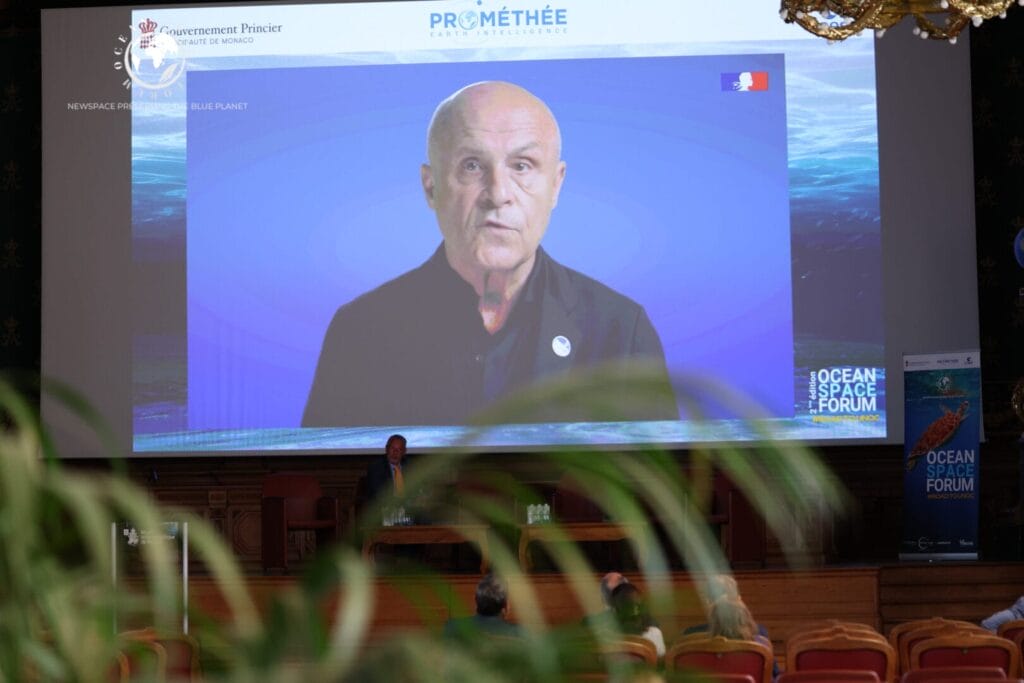
- Giao-Minh NGUYEN, Co-fondateur, Chief Strategy & Innovation Officer, Prométhée Earth Intelligence
- Isabelle BERRO-AMADEÏ, Conseiller de Gouvernement- Ministre des Relations Extérieures et de la Coopération, Gouvernement Princier

*This event is endorsed by the United Nations Decade of Ocean Science for Sustainable Development as a Decade Activity. The use of the United Nations Decade of Ocean Science for Sustainable Development logo by an entity outside the United Nations does not imply that the United Nations endorses that entity, its products or services, or the activities it plans to undertake. For more information, please visit: https://forum.oceandecade.org/page/disclaimer

